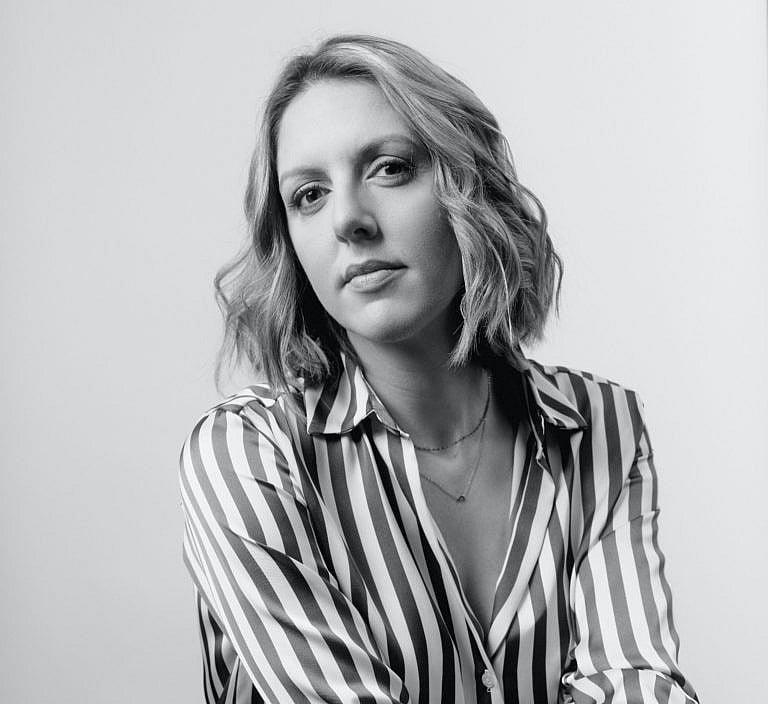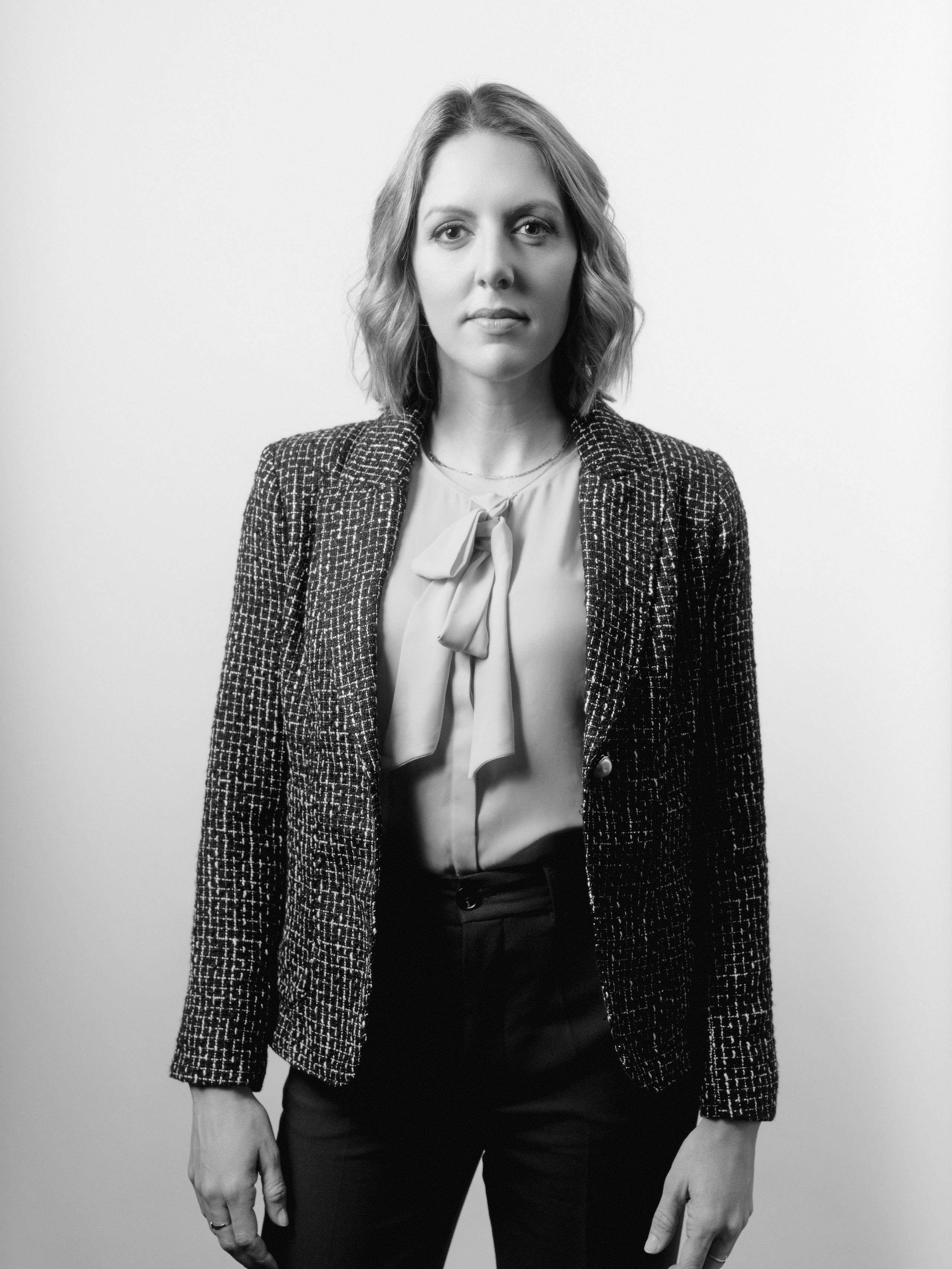Sarah-Ève Pelletier is confronting the ugly underbelly of Canadian athletics
“Certain issues seem to repeat in these sports organizations over time. Now we’re asking, ‘How are these things still happening when it’s not even the same people who are involved?’”

(Photography by Richmond Lam, Hair and makeup by Catherine Laniel)
Share

Sarah-Ève Pelletier has no bad memories. The pool-deck hijinks, the contagious pre-performance euphoria, the sequins—that’s what she recalls about her decorated five-year artistic swimming stint with Canada’s national team. That golden time left such a mark, in fact, that every one of Pelletier’s career moves since has allowed her to keep a toe in the world of sports. After retiring in 2007, Pelletier, a Quebec City native, earned back-to-back law degrees, eventually working as in-house counsel for the Canadian and international Olympic committees.
Now, Pelletier is nearly a year into a role that’s forced her to confront the ugly underbelly of Canadian athletics. Last June, she was appointed the country’s first sport integrity commissioner, leading a new federally funded office meant to manage complaints about alleged abuses and institutional rot within the country’s national sporting organizations. (In mid-May, Sports Canada announced the creation of another oversight body to ensure the commissioner’s recommendations—and any sanctions—are carried out.)Horror stories have come in waves, recounted by athletes from sports as varied as soccer, gymnastics, water polo and bobsleigh. Pelletier’s less focused on restoring their glory than their humanity. Until then, she says, she can’t stop.
I think you said you wanted to go for a walk while we were talking.
Yes, I’m ready for you. I’m outside. I’m not going to walk too far—just in a circle, in the roundabout in front of my house.
Are you one of those people who can’t stop moving?
Yeah. If we were on Zoom, you’d see a lot of me using my hands and jiggling in my seat. My team would tell you that I’m constantly snacking. That probably comes from my old life.
In your new life, you’re Canada’s first sport integrity commissioner. What exactly does that mean?
I oversee the office of the sport integrity commissioner, or OSIC, which is sort of the central hub of Canada’s Abuse-Free Sport program, created last year. We handle complaint management. If an allegation is made against an individual, that could trigger an investigation and sanctions. If the issue is a sports organization, we can initiate an independent evaluation that results in recommendations and so on.
As we’ve seen, these organizations sometimes go to great lengths to protect themselves. (I’m thinking of Hockey Canada’s alleged sexual assault slush funds.) How is your office going to make sure complaints don’t fall through the cracks?
One of the reasons that OSIC was created was to take the management of complaints outside of the organizations so they can be addressed without interference or stalling. Certain issues seem to repeat in these organizations over time—sometimes decades. Now we’re asking, “How are these things still happening when it’s not even the same people who are involved?”
Pascale St-Onge, Canada’s minister of sport, condemned the focus on winning and medals to the detriment of athletes themselves. Remember when Naomi Osaka and Simone Biles very publicly opted out of major tournaments for mental health reasons? That came with a lot of praise, but also a huge uproar.
There’s been a tendency to see athletic performance and self-care as opposites, and I think people are starting to reject that idea. I’m a mother now, so I’m observing sport through a very different lens than I used to. We can learn from how kids approach it all—the joy is in being able to do something that, maybe a day prior, you weren’t. Not because there’s money at the end of the line.
Are your kids swimmers?
They’re both under seven, so a bit too young. The older one is into the uniforms and the making friends aspect of sports. I think that’s universal.
Do you have reservations about putting them in sports, given the risks?
With everything going on in the world, we need sports more than ever. Athletics can have an amazing effect on children and a rallying effect on communities. I still remember watching Sidney Crosby score the winning goal in the men’s hockey final at the Vancouver 2010 Olympic Games. I was finishing my master’s degree in Los Angeles, so I was on the way to the airport to pick up my mom. I watched the game on my cellphone, which took a lot of bandwidth back then.
But what about now?
The ability to mentally prepare for a big presentation, to let go of what’s not in my control—the benefits of sport still affect me today. The flip side is that those who have been hurt feel it long after they stop playing. The current context hasn’t scared me off; I want to make sure sports offer the good they’re meant to.

You clearly had a really positive experience in swimming—nothing like the kinds of mistreatment you’re untangling now. Any favourite memories?
I was involved in probably 11 different activities outside of school: figure skating, diving, gymnastics, tennis, music, dance. Synchro was a combination of all of those things. I remember the big wins, but more so the inside jokes. Some gags have made it to our team reunions 20 years later. We still use the nicknames.
I’m going to need your nickname.
It’s “Poppy.” It came out of nowhere when we were brainstorming choreography in the shallow end. It has no link to my flower preferences. It just stuck.
In retrospect, you probably mostly remember the competition—but maybe also that one really tacky pink costume?
At the high-performance level, the costumes are like pieces of art. My mom and I also sewed some—even during the holidays. I have pictures of us with the Christmas tree. There we are, putting sequins on a bathing suit.
Did you grow up in an athletic family?
My parents were definitely not teaching me technical tricks, if I can put it that way. My mom was an extremely hard worker. She raised me on her own, but she was in the stands at almost every single practice. Sometimes knitting.
What did the do-or-die pressure of elite sports feel like? Have you always had a for-the-love-of-the-game mindset? Were you ever more cutthroat?
I loved to push my own limits, and also the buildup of intensity before a swim. You’re all looking into each other’s eyes, wanting to perform—not just for yourself but for each other. That energy.
So why did you give it all up?
I was in a car accident in 2007, the year before the Beijing Games. Doctors put me on concussion protocols. Was it heartbreaking? Yes. Depending on the circumstances, you can recover from an injury, but it can also be devastating. I think there’s a parallel to be made with people who’ve experienced harm in sport. Sometimes they can continue, but sometimes that journey is altered forever. It’s hard to speak in generalities here.
What does your off-hours engagement with sports look like now?
I was recently reading a book about ikigai, which is a Japanese philosophy that explains longevity. Movement: that’s how I get into flow. I’ll chase my kids around, ski—anything that connects me to the outdoors. The sensation of being in the water will never be lost on me.
Indoor pools can be nice.
They smell too much like chlorine. That’s one thing I don’t miss.